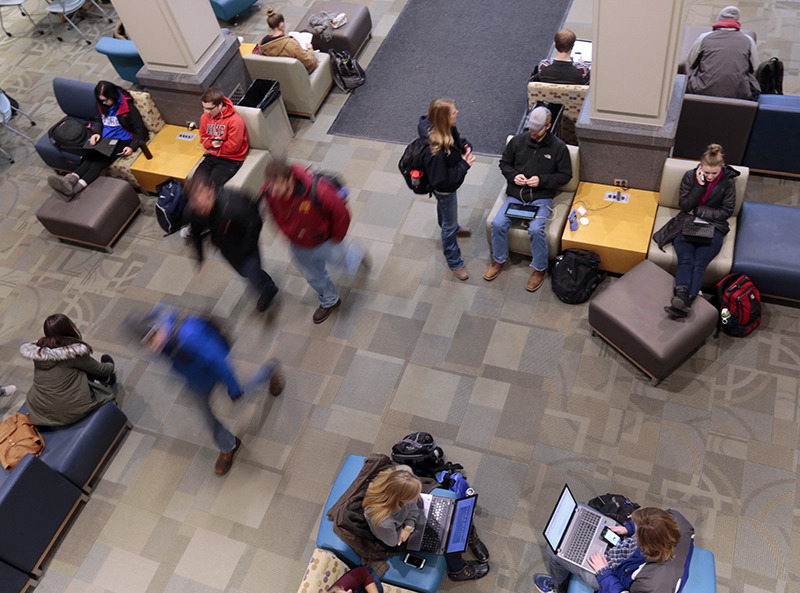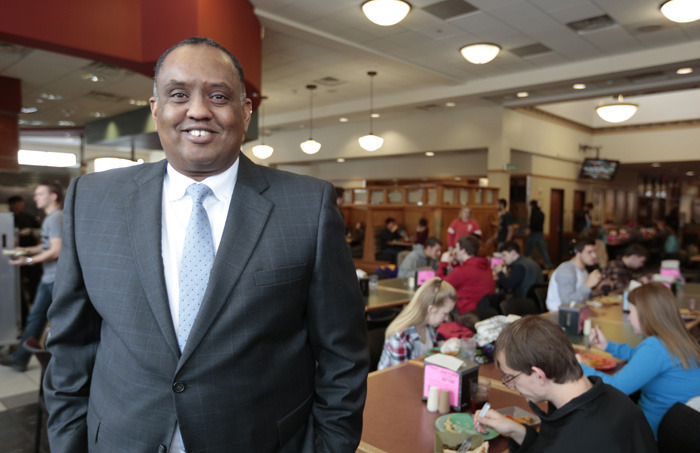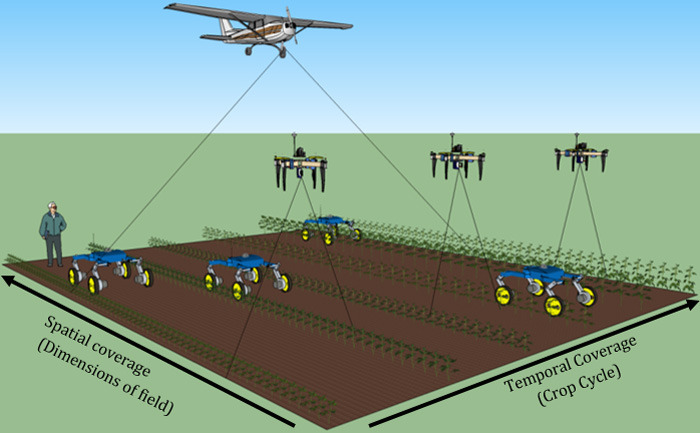Common ground

Curtiss Hall's Harl Commons is fulfilling its purpose, serving as a student-centered space for studying, meeting, relaxing or just grabbing a bite to eat. On Monday, university photographer Christopher Gannon captured a view from above as students utilitized or moved through the space.
Caucusing during class time
While Iowa State has never canceled classes for the Iowa presidential caucuses, and is not canceling classes this year, students who want to attend the caucuses are encouraged to speak with their instructors to determine if they may be excused from class to attend.
"Faculty are in the best position to decide how to teach their classes and support students' needs," said senior vice president and provost Jonathan Wickert. "Decisions about whether to excuse class for events like the caucuses, athletic contests or other events are best handled locally and on a case-by-case basis between faculty and students."
The 2016 caucuses are the first since 2000 to conflict with Iowa State classes. The 2012 and 2008 caucuses both were held during winter break, and the 2004 caucus was held on the Martin Luther King, Jr. federal holiday.
According to Faculty Senate president Rob Wallace, Iowa State already has a comprehensive excused absence policy, developed by faculty, to address the wide variety of student absences that come up over the course of the semester, including the caucuses.
"We encourage students to speak with their instructors prior to the caucuses, or any planned absence, to determine if there is flexibility in class times, if their absence may be excused or if provisions can be made to make up coursework," he said.
Consider the impact
Wickert noted that the situation for a three-hour laboratory that meets only on Monday nights is very different from a one-hour class that meets three times each week.
For spring semester, 884 students are enrolled in 49 class sections that meet between 7 and 9 p.m. on Monday evenings. All of the sections are Monday-only offerings. Students in these classes already have one less class session this semester, since Jan. 18 was a university holiday.
"Missing another week of a course represents a lot of the total time available for learning," Wickert said. "We need to be careful that we're not short-changing students on course content or compressing too much material into the remaining weeks."
Welcome: Dining director

ISU Dining director Mohamed Ali in the Marketplace dining center, Union Drive Community Center. Photo by Christopher Gannon.
Mohamed Ali became director of ISU Dining on Jan. 11. He comes to Iowa State from Athens, Ohio, where he served as auxiliaries operations director at Ohio University.
Ali oversees the university's campus dining system, which now includes four dining centers, 17 retail operations (restaurants, cafés and convenience stores), catering, vending machines, central food store, and technical and business services. Some of his early priorities are to expand the variety in ISU Dining's menu to better serve an increasingly diverse group of diners, target an existing location for faculty and staff use especially (but not exclusively), and keep the Friley dining center construction on schedule for a fall 2017 opening.
Ali's office is in 1215 Friley. He can be reached by phone at 294-7578; by email at alim@iastate.edu.
Related story:
Ali named dining director, Jan. 7, 2016
Four finalists named in EO director search
Four finalists have been selected in the national search for Iowa State's next director of equal opportunity. They are: Sharon Abraham, director of the office of diversity and affirmative action at Eastern Michigan University, Ypsilanti; Ellyn Bartges, director of the office for institutional equity and access at St. Cloud State University, Minnesota; Margo Foreman, associate director of the office of equal opportunity at Indiana University-Purdue University Indianapolis; and Jyl Shaffer, Title IX coordinator at the University of Cincinnati.
The four finalists will visit campus in the next couple of weeks. Each candidate's interview will include a one-hour open forum (3-4 p.m.) with the university community. Forum dates and locations are:
- Monday, Feb. 1: Abraham, 2019 Morrill
- Monday, Feb. 8: Bartges, 2019 Morrill
- Thursday, Feb. 11: Foreman, 1213 Hoover
- Monday, Feb. 15: Shaffer, 2019 Morrill
About the finalists
Abraham has led Eastern Michigan's office of diversity and affirmative action since 2006. She served as the university's interim Title IX coordinator in 2014-15. Previously, she was a self-employed human resources consultant (2004-06). She led the office of diversity and compliance at Oakland University, Rochester, Michigan (1996-2002), and an Oakland program for K-12 students in eight public school academies (2002-04).
Abraham earned a bachelor's degree in organizational behavior and industrial relations and a master's in business administration (marketing), both from the University of Michigan, Ann Arbor.
Bartges has served as St. Cloud State's equity and affirmative action director since 2010. Previously, she served for eight years in several capacities in the office of equal opportunity and access at Western Illinois University, Macomb (2002-10). From 1988 to 2000 she coached multiple high school girls and college women's teams in Illinois and North Carolina, primarily in softball and basketball.
Bartges earned a bachelor's degree in history (1985) from Iowa State, master's degree in history (2005) from Western Illinois, and doctoral degree in kinesiology and in cultural, pedagogical and interpretive studies (2014) from the University of Illinois, Champaign-Urbana.
Foreman became associate director of the office of equal opportunity at IUPUI in 2015, but she has worked in the office since 1999, starting as executive secretary to the director. She also held the positions of equal opportunity specialist and assistant director of diverse workforce recruitment and retention. She was an adjunct faculty member in the university's school of engineering and technology and school of public health (2014-15).
Foreman earned a bachelor's degree in general studies (concentration in social behavior science), and a master's degree in public health, both from IUPUI.
Shaffer has served as Title IX coordinator for Cincinnati's three campuses since 2014. Previously, she was an equal opportunity specialist/Title IX investigator at the University of Houston (2013-14), assistant dean of students at Reed College, Portland, Oregon (2011-13) and coordinator of victim services for the Vanderbilt University police department, Nashville (2009-11). She served as a county director for the HomeSafe domestic violence program in Gallatin, Tennessee (2006-09).
Shaffer earned bachelor's degrees in history and education (2002) from Clarion University, Pennsylvania; and a master's degree in conflict management (2011) from Lipscomb University, Nashville.
About the search
Associate provost for faculty Dawn Bratsch-Prince and senior associate athletics director for sports administration Calli Sanders are leading a seven-member search committee. The Massachusetts-based Spelman and Johnson Group is assisting with the search.
Iowa State's EO director manages all aspects of equal opportunity and affirmative action programs, from ensuring university compliance with laws and regulations to investigating and resolving complaints. The position reports to the president's office. Mary Sirna, administrative adviser for ISU police, has been serving as interim EO director since October.
Presidential initiative advances four big data research teams

Airplanes, drones and rovers could collect huge amounts of data from farm fields. The presidential research initiative is supporting an interdisciplinary team that will work to make sense of all that data. Submitted image.
The second round of awards in the Presidential Initiative for Interdisciplinary Research will help build four big data research teams and launch major projects in digital agriculture and intelligent text analysis.
The four new awards are designed to strengthen data-driven science on campus, build teams of faculty members across disciplines, create research partnerships beyond campus and eventually establish new research centers capable of winning external funding.
"Building and supporting these four research teams will help Iowa State be a pioneer and a leader in big data," said President Steven Leath. "Data science now impacts every field, from business to engineering to the natural, physical and social sciences. By finding new and better ways to extract knowledge from large and complex data sets, we can advance all those disciplines, educate students and develop our state's economy."
Here are this year's winning teams, selected from 10 proposals involving 100 faculty members:
-
Data-Driven Discoveries for Agricultural Innovation, $750,000 research support over three years, led by Carolyn Lawrence-Dill, associate professor of genetics, development and cell biology; Asheesh Singh, assistant professor of agronomy; and Baskar Ganapathysubramanian, associate professor of mechanical engineering.
The team of 19 faculty members from across campus will work to make significant strides in the collection, management, interpretation and use of data related to agriculture. The project's vision "is to set the stage for ISU to become the recognized international research source of expertise in data-driven agriculture," the researchers wrote in their project summary. -
An Automated Functional Language Extraction (AFLEX) System to Transform the Translation of STEM Research to Society, $450,000 research support over three years, led by Annette O'Connor, professor of veterinary diagnostic and production animal medicine. The team's seven researchers also represent the English, statistics, computer science, industrial and manufacturing systems engineering and food science and human nutrition departments.
They'll work to improve society's access to scientific research findings and enhance communication among scientists. They'll develop a system capable of identifying and extracting relevant data from the overwhelming amount of information in scientific texts. "When scientific findings are retrieved, summarized and communicated to decision makers in a timely manner, the societal impacts include informed decision making and reduced research waste," the researchers wrote in their project summary. -
Big Data for Sustainable City Decision Making, $50,000 for one year of planning and development, led by Ulrike Passe, associate professor of architecture and director of the Center for Building Energy Research. The team's 10 researchers also are from statistics, computer science, industrial and manufacturing systems engineering, human computer interaction, English, community and regional planning, agronomy and the City of Des Moines.
The team aims to develop data-intensive, decision-making systems to help leaders create more livable, sustainable and resilient cities. The team's initial focus will be on energy conservation policies. -
Combining Big Data and Survey Data to Meet New Challenges in Data-Driven Policy Development and Evaluation, $50,000 for one year of planning and development, led by Zhengyuan Zhu, associate professor of statistics. The team's nine researchers are also from economics and civil, construction and environmental engineering.
The team plans to develop innovative methods for combining multiple survey and other data sources to transform how policies are made and evaluated. The initial focus will be on food assistance programs and water quality initiatives.
Vice president for research Sarah Nusser said the initial presidential research awards (2013) already have produced large-scale research collaborations with other universities, federal agencies and industry partners. Those collaborations have attracted more than $30 million in external support.
"The program very successfully fostered research teams that could build the scale, stature and impact of interdisciplinary research at Iowa State," Nusser said. "And so we asked President Leath to continue to support the initiative, especially to pursue his goal of becoming a leader in big data."
If funding is available, Nusser said the initiative would continue with another round of awards supporting big data research teams. A request for proposals is expected in February. Details will be shared on the VPR's website.
Related story:
New research initiative is designed to advance data-driven science, April 9, 2015
Welcome: Web accessibility coordinator

Photo by Christopher Gannon.
Zayira Jordan became Iowa State's first web accessibility coordinator on Jan. 19. In the new post, Jordan will coordinate university efforts to build and maintain websites, instructional technologies and other online resources that are accessible to everyone, including those who have visual, auditory, physical or other kinds of disabilities.
Jordan will focus on integrating universal design into Iowa State's digital products and services.
"Universal design is simply good design and it will enhance the user experience for the entire university community and everyone else who connects with Iowa State," Jordan said. "It is easily transferrable from desktop to mobile. It's flexible, adaptable, intuitive and responsive to the users' needs. It is designed for everyone and anyone to the greatest extent possible."
Over the past two years, Jordan has served as assistant director of ISU’s McNair Program, a federal program to help underrepresented and first-generation college students pursue doctorates, and a lecturer in the human computer interaction program. Prior to that, Jordan was associate professor and grant proposal manager with Polytechnic University, Puerto Rico.
Jordan's office is in 209 Durham. She can be reached by phone at 294-0982 or email at zjordan@iastate.edu.
Related story:
Search is on for web accessibility coordinator, Aug. 27, 2015
Reiman Gardens launches 20-year master plan

A schematic of Reiman Gardens' future southern gardens. Contributed photo.
Reiman Gardens isn't getting bigger, but it is getting better.
The gardens' staff recently announced the completion of a 20-year master plan that has been in the works for almost two years. The plan doesn't increase the acreage of the gardens, but rather makes better use of the current space.
"Right now there's a lot of turf or open grassy areas, and the new plan will utilize the existing space more effectively," said Ed Lyon, director of Reiman Gardens. "We're packing more into it but the circulation of the entire space will be better. People will be able to self-direct more easily."
In full view
Visit the Reiman Gardens website for a birds-eye schematic drawing of the future gardens.
The site plan cost about $200,000. Reiman Gardens received a $95,000 grant from the Institute of Museum and Library Services in 2013, which helped kick-start the design process. The balance was paid with gardens' revenue. Most of the funds were used to hire two landscape design firms that specialize in public gardens -- 3 Fromme Design, Sanford, Florida; and Spurlock Poirer, San Diego.
Groups and individuals from the university and the city of Ames also were involved with the gardens' site plan, including President Steven Leath and First Lady Janet Leath.
"The plan fits with President Leath's vision to make the south campus entrance beautiful," Lyon said.
What will change
The 20-year plan incorporates several new gardens, a small lake and water features, such as cascades and falls. New hardscape additions include terraces, boardwalks, courtyards, arbors, a stone amphitheater and a new visitor center. Large schematic designs of the plan are on display in the lobby of Reiman Gardens' main building.
Lyon said many components of the new plan reflect Reiman Gardens' Iowa roots, including the use of limestone and edible plants, a nod to Iowa's contribution to food production.
The Reiman Gardens site plan does not encompass future plans for the south side of Jack Trice Stadium, but both plans will complement one another.
"They are two separate spaces, but not disparate," he said.
What will stay the same
Despite the changes and additions, the gardens' educational mission remains unchanged.
"The gardens won't be just beautiful, they will be educational," Lyon said. "There's not a garden we're developing that doesn't include an educational component."
Many favorite aspects of Reiman Gardens are staying put.
"A lot of elements will remain," Lyon said. "The Hughes Conservatory won't change and the butterfly wing will remain, but be expanded. All the changes that we're making elevate dramatically what we already have."
If you build it, they will come
A primary goal of the 20-year master plan is to enhance Reiman Gardens' presence throughout Iowa and the nation.
"We hope the changes will not only increase attendance but membership as well, which is a more stable source of revenue," Lyon said.
Lyon added that by enhancing the gardens and offering grander exhibits, he anticipates that Reiman Gardens will become a destination stop, increasing tourism revenue for the city of Ames.
Fundraising
Lyon estimates the cost to implement the 20-year plan is at least $25 million. Reiman Gardens will raise the money through several campaigns beginning in the fall and continuing over the next several years. As funds are raised, projects will be implemented.
Some funds already are in the coffer, thanks to Iowa State's 1955 graduating class. The donations will initiate development of the new Hillside Garden (west-central portion of the gardens) this spring, with completion planned by the end of year. Other revenue sources for implementation include university funding, grants and revenue from the Nature Connects traveling exhibits.
Though the transformation of Reiman Gardens will be gradual over the next 20 years, Lyon is excited about the changes.
"This site plan fulfills so many goals," he said. "You can't elevate Reiman Gardens without also elevating the Iowa State and Ames communities."

A schematic of Reiman Gardens' future northern gardens. Contributed photo.

A schematic of Reiman Gardens' future central gardens. Contributed photo.
Strategic plan: Comments sought, spring forums set
If you've got ideas that should be part of the university's next strategic plan, now's the time. Comments submitted by Feb. 10 will be considered by subcommittees as they begin wrapping up their final reports to the steering committee.
Comments can be submitted online to the steering committee or any of five subcommittees -- student experience, research profile, economic development and service to Iowa, campus environment and infrastructure. A sixth, the creative opportunities subcommittee, tasked with funneling out-of-box ideas to the other subcommittees, has completed its work.
The subcommittees will complete their charges over the next few weeks, said Steve Freeman, steering committee chair and University Professor of agriculture and biosystems engineering. To find out more about the subcommittees' progress, check out their meeting minutes on the strategic plan website.
Draft to the president in mid-March
With the subcommittee reports in hand, the steering committee will fashion a first draft of the strategic plan that will guide Iowa State through June 30, 2022. The draft will be submitted to President Steven Leath in early March and the university community should get a look at the proposed plan in mid-March. Comments on the plan will be solicited over the remainder of the semester.
Spring forums
Faculty, staff and students are encouraged to discuss the draft plan at two open forums in the spring. The forums are scheduled for:
- Thursday, March 31, 4:30-6 p.m., Memorial Union Gallery
- Tuesday, April 5, noon-1:30 p.m., Memorial Union Oak Room
Related stories:
Strategic plan groups summarize early efforts, Dec. 17, 2015
Strategic plan is a list, not a framework, Dec. 3, 2015
Activities planned for Black History Month
The multicultural student affairs office has compiled a schedule of events in recognition of Black History Month, celebrated in February. Four individuals, nominated by students, also will be featured by multicultural student affairs -- through its social media channels and newsletter -- in a weekly spotlight of black faculty and staff.
“Black History Month, the brainchild of noted historian Carter G. Woodson (and other prominent African Americans), is an annual celebration of the broad range of achievements made by Black Americans and is also a time to recognize the central role of African Americans in U.S. history," said Gralon Johnson, MSA coordinator for multicultural programming. "Like many colleges and universities across the country, the Office of Multicultural Student Affairs here at ISU is thrilled to have collaborated with a robust list of campus partners to coordinate educational and engaging activities throughout this critically important heritage month."
Johnson said MSA's programming partners included the Black Faculty/Staff Association, Black Student Alliance, Black Graduate Student Association, Division of Student Affairs, Margaret Sloss Women’s Center, ISU Dining, Student Activities Center, ISU Lectures Program, Student Union Board, University Relations and the Office of the Vice President for Diversity and Inclusion.
Black History Month schedule of events
Admission is free, unless indicated.
- Feb. 4, Soul food lunch (11 a.m.-2 p.m., Seasons, Union Drive Marketplace and Conversations dining centers), $11
- Feb. 4, Black Achievement Series, interactive awareness display (noon-2 p.m., MU north stairwell)
- Feb. 5, NAACP Freedom Fund banquet, keynote by Iowa state Rep. Ruth Ann Gaines (6 p.m., Scheman Building), $55
- Feb. 7, Super Bowl party (5:30 p.m., Multicultural Center, Memorial Union)
- Feb. 9, Volleyball at the Rec (7 p.m., Lied Center)
- Feb. 11, Lecture, "Social Justice, Public Service and the Search for Life that Matters," Wes Moore, combat veteran, Rhodes Scholar, White House fellow and author (8 p.m., MU Sun Room)
- Feb. 15, Veritas Forum, "Toleration and Justice in a Broken World," Alex Tuckness, ISU political science (6 p.m., MU Sun Room)
- Feb. 17, Performance, comedian Kenan Thompson (8 p.m., Stephens Auditorium), $20
- Feb. 17, Black Achievement Series, interactive awareness display (noon-2 p.m., MU north stairwell)
- Feb. 18, Panel, "Sister, Sister: Black Women as Activists in Civil Rights and Social Justice Movements Today," Natasha Croom, ISU School of Education; Lorraine Acker, Margaret Sloss Women's Center; and Audrey Kennis, ISU Design (7 p.m., 268 Carver)
- Feb. 19, Social Justice Summit (6-9 p.m., MU Sun Room)
- Feb. 20, Social Justice Summit (9 a.m.-4 p.m., Sunstream Retreat Center, 1130 Juneberry Rd., Ogden)
- Feb. 21, Soul Food Sunday (5 p.m., Legacy Tower, 119 Stanton Ave.)
- Feb. 22, Movie, Race, biopic about Olympic gold medalist Jesse Owens (time to be announced, Cinemark Movies 12, 1317 Buckeye Ave.), $8.50
- Feb. 23, Lecture, "Mass Incarceration and the Masking of Inequality," Betty Andrews, president of the Iowa-Nebraska NAACP State Area Conference of Branches (6 p.m, 205 Carver)
- Feb. 24, Black Achievement Series, interactive awareness display (noon-2 p.m., MU north stairwell)
- Feb. 29, Book reading and discussion, The Meaning of Freedom: And Other Difficult Dialogues, (4:10 p.m., contact Jonathan Webb, 294-4046, jwebb@iastate.edu for location)
